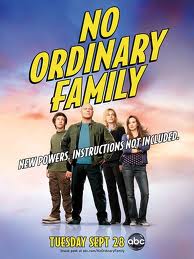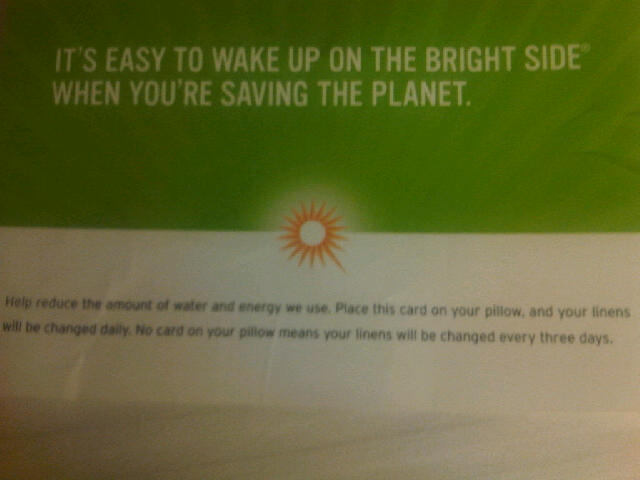
I just watched the premier of ABC’s No Ordinary Family on Hulu. I’ll be following this show hoping that subsequent episodes are as good as the premier. The show is very good for a few reasons.
1.This family has a good husband/father.

Michael Chiklis plays Jim Powell, father, in No Ordinary Family
Most television shows feature extremely lousy fathers. Usually the father is lazy at work, unfaithful or barely faithful to his wife, and/or so stupid that the children are smarter than he. This is one symptom of a larger cultural assault on fatherhood and real masculinity that will require it’s own article to discuss. The No Ordinary Family father, played by Michael Chiklis, who you’ll remember as Ben Grimm/The Thing (The rock guy) from The Fantastic Four movies, loves his wife and their two teenage kids. While he feels helpless to do so, he keeps trying to do what he can to strengthen relationships with his kids, and lead the way back to healthy and constructive relationships as the man of the house.
He tries to play catch with his kids for fun, and go on dates with his wife, though no other family members respond well. However, his teenage daughter (played by Kay Panabaker who has been in several made for TV movies and several tv series in limited roles) mentions mid-way through this first episode when talking to her mother that she usually talks to her dad about difficult situations. His son (played by Jimmy Bennet who played the young James T. Kirk in the most recent Star Trek movie) connects better with his father as well as the show makes clear the mother doesn’t spend any time with him either.
This father cares about his wife and his kids, and wants what’s best for them, which includes a strong relationship with their father.
2. It’s about a family trying to re-connect.

Julie Benz plays the mother, Stephanie Powell, in No Ordinary Family
The plot begins when the mother (played by Julie Benz from Buffy, Angel, Dexter and what looks like a bunch of horror movies) has to head to Brazil on a business research trip. Michale Chiklis’s character insists on changing the trip into a family vacation as a time to re-connect with each other. The one time on the trip he gets them all in one place is on a small plane which subsequently crashes and … but enough about tiptoeing around spoilers -as the previews show, they discover they have super powers. These new unknown and unexplored abilities bring the family together, forcing them to place family higher than work, Internet, and texting. They realize they need to be able to depend on each other more than anyone else, and by the end of the pilot, everyone wants what the dad has wanted – to re-connect as a family, and foster healthy relationships.
3. It’s true to life.

Jimmy Bennett plays the son, JJ Powell, in No Ordinary Family
Given, parasites are more common to bring back from South America than super powers. In many ways, this episode was about normal life. The teens are talking twitter and texting.
The son struggles with schoolwork and the daughter struggles with insecurity. The mother is having to juggle work and family priorities and the father questions his confidence at his job. These are life’s real struggles.
The camera pauses on details like the mother noticing kids in another car making a mess of their snacks. A man stands on the shoulder looking under the hood of his car. Normally these details stand out because the writers had to put them in as clues to something later in the story. Here it seems to be because this is what life as a parent is like. These are the things that stand out in a normal super-sonic run – or drive – down the highway for all of us.
4. The family’s powers correspond to their struggles.

Kay Panabaker plays the daughter, Daphne Powell, in No Ordinary Family
The father feels helpless in bringing his family together, he feels weak as a father and as an employee at the police station as a sketch artist. He is gifted with strength. He can catch bullets, hit hard, jump high, and fall off a tall building without getting hurt.
The mother feels like she can never catch up to everything she has to do as a mother and a career woman. She is gifted with speed, so she bypasses traffic and has time to spend with her kids and husband that have taken a lower priority than her job.
The daughter is self-conscious about what other people think about her, so she is gifted with the ability to read thoughts. One quick benefit is that she breaks up with her boyfriend when she finds out he isn’t following through on his repeated commitment to wait to have sex as she’s committed.
The son discovers his last, but his weakness is feeling dumb at school. Guess what he is gifted with?
It’s very heart-touching to see these years-long or life-long struggles start to be repaired though these new giftings.
Summary
The show is fairly family friendly. The theme is about how to keep the family together and how to make it healthier, thought there is some bad language from both teenagers and the parents. There’s some violence as the father works at the police station and attempts to be a hero, so there’s some fighting and guns firing at him and others.
I liked the first episode and look forward to more. It’s positive. It’s about family. It’s true to life. It’s got a good father. I grow weary of shows about murder, even if there are some family relationships. I’m hoping that even if this show, with it’s potentially crime-fighting-family, ends up with lots of crimes, that it remains a show about family values.
Then again, this is on ABC, known as the most extreme network in pushing liberal values.
Here’s the preview:















